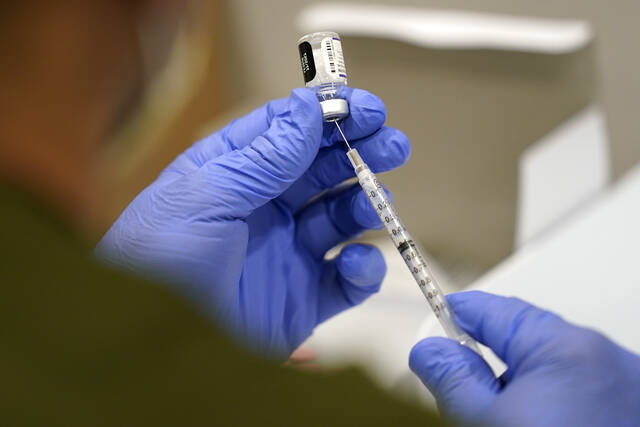
(AP Photo/Lynne Sladky, File) FILE - A healthcare worker fills a syringe with the Pfizer COVID-19 vaccine.
COLUMBUS, Ind. — Columbus Regional Health is prepared to start administering second COVID-19 booster shots for older residents and most people with severely weakened immune systems following the green light from federal and state regulators.
The Food and Drug Administration authorized an extra dose of the Pfizer or Moderna shots Tuesday for all Americans 50 and older, as well as anyone age 12 and up who have weakened immune systems, if it has been at least four months since their last vaccination.
Following the FDA’s decision, the Centers of Disease Control and Prevention recommended the extra shot, citing evidence that protection from the virus can wane particularly in higher-risk groups.
“This is especially important for those 65 and older and those 50 and older with underlying medical conditions that increase their risk for severe disease from COVID-19 as they are the most likely to benefit from receiving an additional booster dose at this time,” CDC Director Dr. Rochelle P. Walensky said in a statement.
CRH does not plan to reopen its emergency standalone clinic near the hospital campus in Columbus and will instead handle vaccinations through its doctors’ offices, said CRH spokeswoman Kelsey DeClue. Local residents can also go other community sites, including the Bartholomew County Health Department and local pharmacies.
“Consider your timing, look at your vaccine series, and if you’re getting between that four- to six-month-out range of your last vaccine, whether it was second or third shot or the original one, really consider (getting a booster), especially with this BA.2 (subvariant),” DeClue said. “We’re potentially watching for a surge in May regarding that variant. The high-risk crowd is going to be more susceptible to however that variant plays out.”
The B2.A subvariant is a descendant of omicron but is about 30% more contagious than the original omicron strain. BA.2 is already starting to gain ground in the United States and is believed to be behind a new wave of infections in Europe.
Though officials are anticipating a potential spike in cases in the coming weeks, they do not anticipate a major surge like the one that overwhelmed the local health care system this past winter, DeClue said.
“We’re cautiously optimistic that even if we see a spike here in the late spring, it won’t be anywhere near the severity of the last surge,” DeClue said.
For the complete story, see Friday’s Republic.




